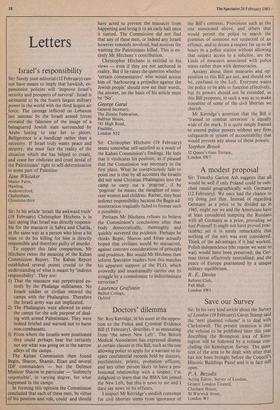Doctors' dilemma
Sir: Roy Kerridge, in his sneer at the oppos- tion to the Police and Criminal Evidence Bill (5 February), describes it as emanating from 'the newer New Left'. The British Medical Association has expressed dismay at certain clauses in this Bill, such as the one allowing police to apply for a warrant to in- spect confidential records held by doctors, psychiatrists, priests, probation officers, and any other person likely to have a pro- fessional relationship with a suspect. I'm delighted to learn that the BMA has joined the New Left, but this is news to me and I dare say news to its officers.
I suspect Mr Kerridge's modish contempt for civil liberties stems from ignorance of
the Bill's contents. Provisions such as the one mentioned above, and others that would permit the police to search the premises of someone not suspected of an offence, and to detain a suspect for up to 48 hours in a police station without allowing that suspect access to a solicitor, are the kinds of measures associated with police states rather than with democracies.
Anxiety about these measures and op- position to this Bill are not, and should not be, confined to the Left. Everyone wants the police to be able to function effectively, but its powers should not be extended, as this Bill proposes, in such a way as to make nonsense of some of the civil liberties we cherish.
Mr Kerridge's assertion that the Bill is ' framed to combat terrorism' is equally wide of the mark. It is quite simply framed to extend police powers without any firm safeguards or system of accountability that would prevent any abuse of those powers. Stephen Brook
12 Queen's Gate Terrace, London SW7










































 Previous page
Previous page